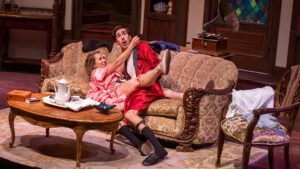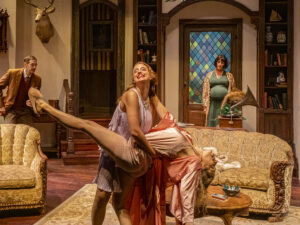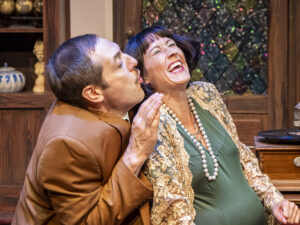
 ***** Sandy Rustin’s lively romantic comedy “The Cottage” could not have been done any better! The current production by Citadel Theatre is sensational in all aspects as it brings this engaging and hilarious Broadway favorite to a Chicago audience for the first time. This is a story about marriages, trysts, and romances, and it dares to ask the question of whether faithfulness is even necessary to a lasting relationship. Is it better to pretend that there is such a thing as wedded bliss—or to cede the fact that affections may change and that romantic partners could (or should) be swapped over the years? And if so, then should this be done openly or in secret? And what exactly is love? Is it the glue that keeps people and relationships together? Can its meaning change over time? Is the secret to happiness having a healthy sex life or having ambitions of having children and a happy family? Or does it all depend on individual tastes and preferences?
***** Sandy Rustin’s lively romantic comedy “The Cottage” could not have been done any better! The current production by Citadel Theatre is sensational in all aspects as it brings this engaging and hilarious Broadway favorite to a Chicago audience for the first time. This is a story about marriages, trysts, and romances, and it dares to ask the question of whether faithfulness is even necessary to a lasting relationship. Is it better to pretend that there is such a thing as wedded bliss—or to cede the fact that affections may change and that romantic partners could (or should) be swapped over the years? And if so, then should this be done openly or in secret? And what exactly is love? Is it the glue that keeps people and relationships together? Can its meaning change over time? Is the secret to happiness having a healthy sex life or having ambitions of having children and a happy family? Or does it all depend on individual tastes and preferences?
This fun, easy-going, and playful British farce keeps the audience entertained and on its toes at every moment—and yet Rustin, the playwright, was raised in Glenview and graduated from Northwestern University!
The setting is a comfortable country house ninety minutes outside of London in the year 1923. Sylvia (Elizabeth Bushell) is married to Clarke (Joel Ottenheimer) but is actually having an affair with his brother Beau (Philip J. Macaluso). But Beau is cheating on both Sylvia and his pregnant wife Marjorie (Shannon Bachelder) with his constant affections for Dierdre (Melody Rowland), a young woman who is already married to Richard (John Dooley). Saying anything more will ruin all of the surprises and nuances as well as the humor. That being said, the story is nicely fleshed out, and every actor has been perfectly cast for their role! The dialogue is razor sharp and rip-roaringly fun. The directing by Jack Hickey is sublime, especially when we see all the commutations and permutations having to do with the pairings of the individual couples during different portions of the story. Above all, the acting is phenomenal! We watch the characters struggle with the consequences of their romantic choices and the aftereffects of their betrayals. Although the characters are largely exaggerations, they are nevertheless quite relatable. For example, Rowland (in the character of Dierdre) is a scream every time she addresses the audience. She is the only one who breaks down the fourth wall, with the fascinating implication that most of us watching the performance are more likely to be like her than any of the other characters in the show!
Yet the play has its serious underpinnings, grounded in British history and law and having to do with the empowerment of women. Traditionally, not only did a woman need a man to have some measure of social status, but a man also needed to have a wife and produce heirs. Since it was considered a stigma when a husband couldn’t keep his wife and family together, it was usually in the best interests of both parties to display marital contentment and stability for appearance sake (while both possibly may have had affairs on the side). But “The Cottage” takes place in a period of time when the social norms were slowly changing with a series of acts passed by the British Parliament that gradually accorded rights to married and divorced women. According to Wikipedia, “The Divorce and Matrimonial Causes Act of 1857 denied the husband his right to the earnings of a wife he had deserted, and returned to a woman divorced or legally separated the property rights of a single woman. The Married Woman’s Property Act of 1870 allowed women to keep earnings or property acquired after marriage; a further Married Woman’s Property Act in 1882 allowed women to retain what they owned at the time of marriage.” Once women were allowed to own and retain both personal property and real estate during marriage and after divorce, then they no longer needed to be tied to a man to obtain social status and some measure of social and financial independence.
In the play, we see how the men initially assert that property rights are their exclusive domain, but we witness how the women exercise control over property via wills and other legal documents. So the question underlying this play becomes whether social conventions regarding love, sex, and marriage finally catch up to economic reality. In other words, now that women did not necessarily need to have a man for economic and financial reasons, this could translate into being choosier regarding their choice of mates—and they could possibly marry for love and romance. Whereas in 1857, a married man could acquire a divorce paper for a woman who was unfaithful, it was in 1923 when a married woman was finally allowed to do the same with regard to an unfaithful man. In our current society, we take a lot of these rights and freedoms for granted, but much of this was relatively new for British women back then. The furthering of women’s independence combined with shifting social norms for both sexes soon made it more of a matter of individual taste and preference as to what people chose to do with their private lives—as compared to hiding their dalliances under cover of marriage in order to retain their position in respectable society.
Lovely scenic design by Eric Luchen features a vintage living room with a pretty stained glass door, a nice staircase, dark wooden doors and floors, period wallpaper, and a large wooden trunk. But it is the props design by Audrey Tieman that is resplendent: with a huge deer head on one wall, an elegantly hand-crafted sofa, a victrola, a bar with glassware, a pendulum clock, cigarettes hidden in all sorts of interesting places, plus all sorts of fine detail that we see before the show starts, such as pantyhose thrown over a chair and a tie hanging from the deer head. Rachel Sypniewski’s costume design is perfect for the time period and yet often comically funny when a new character enters the stage. For example, we see Beau wearing garters and Marjorie wearing a huge green hat. Lighting design by Ellie Fey is exactly what it should be for this kind of production. Dialect coach Megan Lorie has gotten the cast to speak in fine British accents, while sound designer Maya Reter has ensured that we hear every single word of the show. But the highest compliment needs to be paid to intimacy director Sheryl Williams, who has made the cast comfortable with assorted scenarios that entail very close contact among the cast, especially when the actors portray their affections for each other and when they deal with a character who is drunk and unruly.
The production makes us think about how love, romance, sex, desire, and unrequited love all mean something different to each of the characters—and most likely, something different to each one of us in the audience. And that’s what makes the story so exciting. Bushell’s acting is superb, as we see her charisma exude on stage in the role of Sylvia, the bee-flower who has charmed lots of men at various points in her life. Now being the somewhat more mature lady, she knows exactly what she wants out of a relationship and won’t settle for anything less! While both the male and female characters weave more and more of a tangled web over time, this is still a simple tale; and we can easily sit back and take it all in. Once the laughs begin, they continue and continue and continue! This is one of the best shows I’ve seen all year. The performance is sure to brighten your day! This is a MUST SEE!
“The Cottage” is playing through October 13, 2024 at the Citadel Theatre, 300 S. Waukegan Road, Lake Forest, Illinois.
Tickets are $45 plus a $3 processing fee.

Performance schedule:
Thursdays, Fridays, Saturdays – 7:30 p.m.
Sundays – 3:00 p.m.
Additional performances:
Wednesday, September 25th and Wednesday, October 9th, both at 1:00 p.m.
For more information and to purchase tickets, visit: https://www.citadeltheatre.org/202425-season.
To see what others are saying, visit www.theatreinchicago.com, go to Review Round-Up and click at “The Cottage”
EDITOR’S NOTE:
After reading Julia’s review, I had to go to Citadel to see this very funny production. Farce is fun! I recall my summer at Shady lane Farm Playhouse in Margengo when we did shows like “Critic’s Choice”, “Up In Mabel’s Room” and “Getting Gertie’s Garter”- all silly, slapstick and hysterical. Talk about taking one’s mind off the news of the day- this is the perfect escape!
I must say that Jane laughed out loud more than usual and the almost full house had a ball. Jack Hickey’s direction was flawless and the set by Eric Luchen is quite realistic. The amazing dexterity of Melody Rowland as Diedre shows off her comic ability as well and the cast of six could easily handle any of the shows that Shady Lane did in the past. In fact, if the Citadle stage was large enough to do “Noises Off” I think these folks could pull it off.
If you need a break from the world around you- this is it!






More Stories
“Dummy in Diaspora”
“The Magic School Bus: Lost in the Solar System”
“February House” reviewed by Julia W. Rath